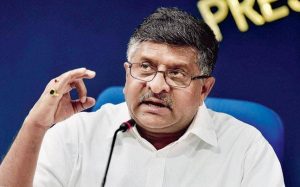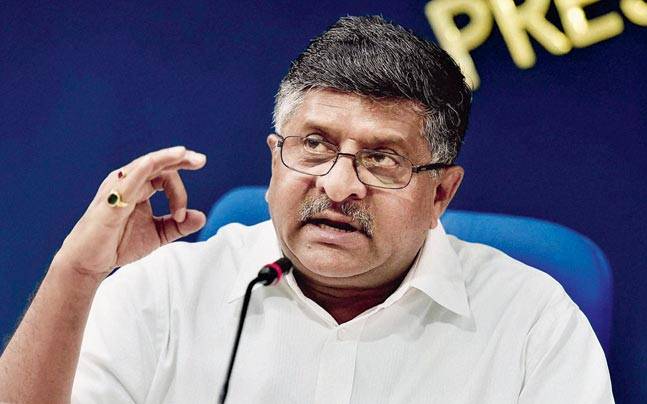 Janjivan Bureau / New Delhi: The government hailed the Supreme Court verdict that declared the right to privacy is a fundamental right under the Constitution on Thursday .
Janjivan Bureau / New Delhi: The government hailed the Supreme Court verdict that declared the right to privacy is a fundamental right under the Constitution on Thursday .
Addressing to media persons, Law and Justice, Information Technology Minister Ravi Shankar Prasad said, “The government was of the view that the Right to Privacy should be a fundamental right and we welcome the Supreme Court verdict.”
“Before the Supreme Court formed its nine-judge bench on privacy, Arun Jaitley had said that there is right to privacy with reasonable restrictions,” he said.
Prasad, however, blamed the Congress for bringing in Aadhar without any debate on the matter.
“The idea of Aadhaar card was brought by the UPA government without any debate. That is how they worked,” he said.
“Aadhaar during UPA regime had no protection of the law. We made Aadhaar law and provided a legal framework for protecting its data,” the Union Minister said.
“Since morning Congress is targeting us and Left has also joined them.What is the Congress’ record of protecting individual liberty?” Prasad said while launching a further attack on the previous government.
He said the UPA Government had introduced AADHAR scheme without any legislative support. It was in that context that the question of the UPA’s AADHAR scheme was challenged before the judiciary. The NDA Government ensured that necessary legislation was approved by Parliament. Adequate safeguards were also introduced. On 16.3.2016, while speaking on the AADHAR Bill in the Rajya Sabha, the Government through the Finance Minister, had clearly stated – “Is privacy a fundamental right or not? The present Bill pre-supposes and is based on the premise and that it is too late in date to contend that privacy is not a fundamental right. So, I do except that probably privacy is a fundamental right. Now, where do you fit privacy as a fundamental right? And that is where I want to clear the misconception due to which these amendments which have been proposed. It is contended and broadly it is now accepted that privacy is a part of the individual liberty. So when Article 21 says, “no person shall be deprived of his Right to Life and Liberty without procedure established by law”. Then let us assume that privacy is a part of liberty and no person shall be deprived of his privacy without procedure as established by law. The underlying point is that privacy is not an absolute right. It is a right even in our Constitution. If it is a Fundamental Right under Article 21, which is subject to restriction that it can be restricted by a procedure established by law, that procedure established by law obviously has to be fair, just and reasonable procedure. The case before the Supreme court is you have no law, you have not legislated, you have not laid down any guidelines and you have by an executive fiat created authority where all personal data and biometric information will go. What will that be used for? Is this a fair, just and reasonable procedure?”
The Finance Minister was referring to the situation where the UPA Government created an AADHAR without any legislative support. The present Government did exactly the opposite. It gave a legislative support to AADHAR and incorporated in law special safeguards with regard to privacy. It has also assured the Supreme Court that it will soon be coming out with a data protection law for which a committee headed by Justice Sri Krishna, a retired judge of the Supreme Court, had already been appointed.
Today’s judgement of the Supreme Court is a welcome judgement in as much as it strengths the Fundamental Rights and personal liberty. The judgement reads that personal liberty is not an absolute right but liable to the restrictions provided in the Constitution which will be examined on a case to case basis. The Government is of the clear opinion that its legislations are compliant with the tests laid down in the judgement. The Supreme court has stated that ”…requires a careful and sensitive balance between individual interests and legitimate concerns of the State. The legitimate aims of the State would include for instance protecting national security, preventing and investigating crime, encouraging innovation and the spread of knowledge, and preventing the dissipation of social welfare benefits.” The Government is committed to this object.
“In the last 3 years, we have saved close to 57,000 crore rupees that earlier used to go to middlemen,” he added.
Defending the Aadhaar scheme, Prasad said the government has formed a high-powered committee for data protection, which the Supreme Court has noted.
Earlier today, in a landmark verdict, a nine-judge Constitution bench headed by Chief Justice Jagdish Singh Khehar held that the right to privacy is a fundamental right and is an integral part of the right to life and liberty.
The bench was looking into a batch of petitions challenging the Centre’s move to make Aadhaar mandatory for availing benefits of various social welfare schemes.

















